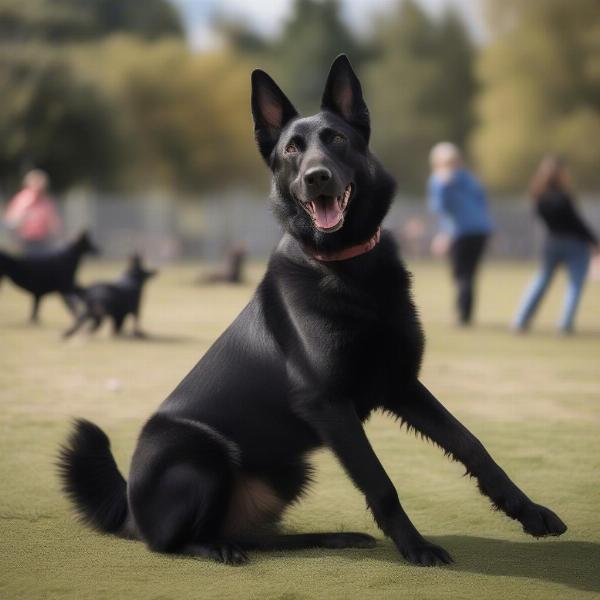Black dogs, regardless of breed, often face unique challenges when it comes to training. Their dark coats can sometimes make it harder to read their body language, which is crucial for effective communication during training. This guide will address the specific considerations for black dog training, covering everything from basic obedience to advanced commands and behavioral modification. Understanding how to best communicate with your black dog will pave the way for a strong, positive, and successful training journey.
Understanding Your Black Dog’s Body Language
While all dogs communicate through body language, the subtleties can be harder to discern in black-coated dogs. Pay close attention to the position of their ears, tail, and overall posture. Even slight changes can indicate their emotional state. For instance, slightly flattened ears might indicate fear or anxiety, while a wagging tail held high signifies excitement. In low-light conditions, consider using a hands-free light or reflective collar to better observe your dog’s movements.
Basic Obedience Training for Black Dogs
Start with foundational commands like “sit,” “stay,” “come,” and “down.” Use positive reinforcement techniques, such as rewarding your dog with treats, praise, or toys when they perform the desired behavior. Keep training sessions short, frequent, and engaging. Consistency is key, especially with black dogs, as clear communication is paramount.
Utilizing Visual Aids and Verbal Cues
Because visual cues might be less obvious with black dogs, clear and consistent verbal cues are vital. Use a firm, yet gentle tone of voice. Consider incorporating hand signals along with verbal commands, which can be particularly helpful for black dogs. For instance, a raised hand for “stay” or a pointed finger towards the ground for “down.”
Addressing Specific Challenges in Black Dog Training
Some black dogs might exhibit certain behaviors that require specialized training approaches. Fearfulness or reactivity can be more prevalent in black dogs, possibly due to the difficulty others have in reading their body language. If your black dog displays these behaviors, seek guidance from a certified professional dog trainer experienced in working with these specific challenges.
Building Confidence and Socialization
Early socialization is crucial for all dogs, but especially for black dogs who might be more prone to anxiety. Expose your dog to various environments, people, and other dogs in a controlled and positive manner. This will help them develop confidence and reduce the likelihood of fear-based behaviors.
 Black dog socializing with other dogs at a park
Black dog socializing with other dogs at a park
Advanced Training and Behavioral Modification
Once your black dog has mastered basic obedience, you can progress to more advanced commands and tricks. Agility training, scent work, or even therapy dog training can be enriching activities. If your black dog exhibits any problem behaviors, consult a professional dog trainer for guidance on behavior modification techniques tailored to their specific needs.
Conclusion
Training a black dog requires patience, understanding, and a focus on clear communication. By paying close attention to their subtle body language, utilizing visual aids, and employing positive reinforcement, you can build a strong bond with your black dog and achieve successful training outcomes. Remember consistency and clarity are paramount to overcoming the unique challenges associated with black dog training.
FAQ
- Are black dogs harder to train? Not inherently, but their dark coats can make reading their body language more challenging, requiring extra attention to subtle cues.
- What are the best training methods for black dogs? Positive reinforcement methods, combined with clear verbal cues and hand signals, work best.
- How can I improve my black dog’s socialization? Expose them to various environments, people, and dogs in a controlled and positive manner from a young age.
- What should I do if my black dog exhibits fear or reactivity? Consult a certified professional dog trainer experienced in working with these behaviors.
- Are there any specific health concerns related to black dog training? Not directly related to training, but black dogs can be more prone to heatstroke, so avoid training during the hottest parts of the day.
- Is clicker training effective for black dogs? Yes, clicker training can be very effective as it provides a clear and consistent marker for desired behaviors.
- How can I make training more fun for my black dog? Use a variety of rewards, incorporate games, and keep training sessions short and engaging.
ILM Dog is a leading online resource for dog owners worldwide, offering expert advice on all aspects of dog care, from breed selection and health to training and nutrition. We are committed to providing practical, reliable information to help you build a strong and loving relationship with your canine companion. Whether you’re a new dog owner or a seasoned expert, ILM Dog has the resources you need to provide the best possible care for your furry friend. Contact us at [email protected] or +44 20-3965-8624 for expert advice and support.